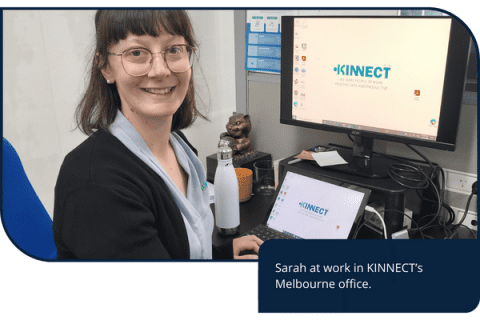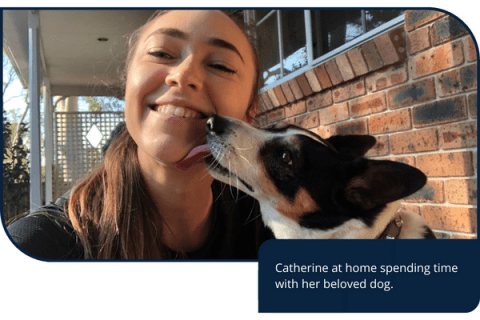Finding your occupational health career groove takes a different type of employer
While aptitude, hard work and enthusiasm are important factors, a person’s choice of employer can be the difference between a career that isn’t a great fit, and a successful career that matches their interests and aspirations.
Two KINNECTers talk about finding their groove and growing meaningful occupational health careers in a different kind of workplace that treats people as individuals and actively participates in their development.
Catherine Smith is an accredited Exercise Physiologist who began her career in pre-employment testing, working with another workplace rehabilitation provider. She started at KINNECT in March 2021 as a Senior Rehabilitation Consultant and quickly progressed into her current role as KINNECT’s Team Manager for Sydney (Mascot).
Sarah Gandolfo is a qualified Occupational Therapist who previously worked in employer injury management and spent three years working as a rehabilitation consultant both in Melbourne and in regional Victoria. She joined KINNECT in 2020 as Senior Rehabilitation Consultant before working her way up to Team Manager for Victoria.
Why did you choose to work for KINNECT?
Catherine: There were a few reasons. I wanted more challenge in my role – I was mainly doing pre-employment assessments, but I had previously done workplace rehabilitation and liked the variety of that role. I was attracted by the fact that KINNECT did occupational health, pre-employment assessments and workplace rehabilitation so could provide that variety for me.
Then I also had the ambition to progress to a team manager position down the line. We started talking about that during my initial interview with Gerald. I could see the managers had a very big interest in myself and my own career development and growth.
Sarah: I was working for an employer doing internal injury management and was looking for a different opportunity. I’d already taken a prevention approach with another provider but there wasn’t a lot of opportunity in that space. I also wanted opportunities outside a consultant role with more project management.
There was a strong focus on culture at KINNECT which separated them from other providers. The videos about what it was like working at KINNECT drew me in.
How does KINNECT differ from other places you’ve worked?
Catherine: From the first day I noticed a big difference in terms of quality and education. In the first month I learned more about workplace rehabilitation and the skills I needed than anywhere else in my career. I remember we had numerous in-services and education sessions where people could discuss case studies.
There’s also the immediate focus on career growth with development plans. You feel that there’s a genuine interest from your managers to achieve your goals. I hadn’t experienced that before and really felt supported to go from the Senior Consultant role I was originally in, to Team Manager a year later. In the first few meetings with my manager, we’d gone throughs scorecards together and discussed my progression into a team manager role in the future.
Sarah: At KINNECT there’s a greater focus on the quality of work and values. This rang through from first day and was such a stark difference to where I’ve worked before.

My experience in workplace rehabilitation prior to KINNECT was with a provider who focussed heavily on billable targets. They didn’t ask “Why are we doing this?” The workers weren’t the centre of everything we did, whereas they are here. The other side is that KINNECT also take a more biopsychosocial approach, or wrap-around approach to the situation, rather than focussing solely on work.
I learnt far more in the first couple of months at KINNECT than I did with any other provider, so I grew a lot as a consultant and enjoyed the industry significantly more than in other roles.
KINNECT is also different in terms of the opportunities they offer. Not long after I started at KINNECT, I began doing more of the projects side of things – which I’d highlighted that I’d like to do early on – and then took on a project management role in Victoria. Despite raising my hand, I wasn’t given that opportunity at my last provider.
How have the differences at KINNECT influenced your professional life?
Catherine: Having so many opportunities for growth has pushed me out of my comfort zone a few times. Presenting was something I found quite nerve-wracking but it’s something I’ve been able to get more comfortable with through delivering manual handling training and the Executive Leadership Program with the CEO. In my current role I’m now delivering in services and training to the team, and it’s allowed me to push myself and develop those skills.
The focus on quality and the ‘why’ of getting someone back to work has definitely influenced me. I’m able to leverage my clinical knowledge as an exercise physiologist to help give them self-management strategies and advice to support their recovery at work.
I can also assist with other barriers external to the injury that we need to be mindful of that affect their social wellbeing and mental health. If we don’t address those in the appropriate way, it’s going to have an impact on their ability to get back to work and back to life. I’ve been able to apply that outside work to help me look after myself and maintain the work-life balance that I need to be happy and healthy.
Sarah: I can see myself working for a lot longer in this industry now than I did at my last workplace.
Because of that it makes my job easier as a team manager to coach and mentor new starters as I’m passionate about the place and I understand why we do things. It’s easy for me to pass on my knowledge and help them grow as consultants.
And I feel like I’m a health professional in this kind of role with KINNECT, whereas having that billable focus at my last job made it difficult to know where the line was between being a health professional and being a businessperson. My role aligns far more with my values of keeping the person at the centre of what we do and creating value for them.
Has KINNECT’s working culture impacted your personal life?
Catherine: As a consultant at KINNECT, you do have some flexibility in your role. If we’ve got commitments outside of work, because of the adaptability of the roles we can work around that.
that.
We have Monday morning meetings when we check in with what have people done over the weekend and we encourage people to engage in things that they love to do.
I’ve been given the opportunity to continue with my hobbies, like going to the gym and playing sport that I love so I can look after myself and stay happy and healthy. That has a good flow on effect at work because I’m energised, I’m well rested and I have that balance. Similarly, if there’s days that I might need to work from home, that’s well accommodated.
Sarah: I play sport outside of work and cycle in the morning on a route where I’d like to stop for a coffee. Having the flexibility to start work a bit later means I give them [KINNECT] the flexibility back. That’s the same principle I offer to my consultants. If you need to work from home or get to the dentist, we can work around it. We might ask you to do an appointment at 5am or 7pm because of the nature of your client’s work, but we would expect you to take that time back.
Everyone has a life outside of KINNECT, that’s important and we talk about that in our weekend highlights. It’s not ticking culture off, it’s ingrained in the company, which I think really sets us apart.
What’s your favourite thing about working at KINNECT?
Catherine: Honestly, I really love what I do. The fact that I’ve been able to grow so much in the couple of years that I’ve been here has be wonderful and has reignited my love for workplace rehabilitation. My favourite thing is my catchups with team. I don’t just review strategy around helping people get back to work and keeping them healthy, I’m able to implement a lot of different skills that I’ve learned and coach my consultants in a way that I couldn’t have done previously. Being able to watch my team grow and succeed and apply new things to their files to get great outcomes is so rewarding.
Sarah: Our team. In Victoria we’ve had some great results recently which means there are more opportunities, so we’ve grown the size of our team over the last year. The biggest thing I’m proud of with the people I’ve brought on board is the chatter, the learning and the culture that’s been fostered. There are opportunities to work from home, but people want to come into the office. It’s a testament to KINNECT and people’s genuine interest in their roles that it happens. Our onboarding and interviews mean we hire the people who will fit bill really well.
Last words…
Catherine and Sarah were both in agreement that anyone considering working with KINNECT would be” “Don’t think, just join us!”. The focus on people, both employees and clients, together with KINNECT’s values-led approach and desire to grow people are key reasons that both valued team members will be at KINNECT for a long time to come.
If you’re interested in a role that will help you reach your career ambitions, why not join us? For information about current vacancies, visit our Careers Centre.